This week’s bible story
Jesus calms a storm: Mark 4:35-41
Have a think about what peace means to you. Is it a time without conflict or is it calmness? Today, we’re going to hear a story about Jesus and his disciples who were stuck on the Sea of Galilee in the middle of a storm.
Time for reflection:
Think about the times when it seems like you’re in the middle of a storm; perhaps when there are arguments or when things seem confusing and difficult or when things are frightening. Think of Jesus being there, saying, Peace, be still. Take a moment now to hear those words, and enjoy the peace they bring.
Prayer:
Dear God,
Help us to remember, even when we’re in the middle of a storm and life seems hard, you are always there to help us feel peace.
Amen
Week beginning 25 April 2022
Sorry that you can’t be in school this week. Here are a range of resources linked to what is happening in class. Don’t forget to get in touch with your class teacher if you need support.
Maths
Follow this sequence of maths learning which is linked to ratio, proportion and negative numbers.
Lesson 1: video, worksheet, answers
Lesson 2: video, worksheet, answers
Lesson 3: video, worksheet, answers
Lesson 4: video, worksheet, answers
Lesson 5: video, worksheet, answers
Lesson 6: video, worksheet, answers
Lesson 7: video, worksheet, answers
Lesson 8: video, worksheet, answers
Lesson 9: video, worksheet, answers
You don’t have to print the worksheet. Your child can write or draw their answers on paper. Your child’s learning will be most effective if you sit with them to pause the clip and check / praise / support your child as the clip moves on.
Practise times tables on Times Table Rockstars, too. Email the class teacher if you need your child’s login and password details.
(Suggested time: 30 minutes of Maths and 15 minutes of Rockstars daily)
Spelling
Look on the homework page to find this week’s spellings. They should choose some past spellings that they feel less confident with. Your child should complete one task each day.
- Day 1: Generate more words linked to the spelling pattern or ‘rule’. You could look out for the words in the book you’re reading at home, or any other text, like a website linked to our science topic of Living Things and their Habitat.
- Day 2: Practise the spellings using two of the ideas in our Super Spelling Strategies guide. (Set yourself and others at home a challenge of using some of the words when you’re speaking, too!)
- Day 3: Write separate sentences, each containing one of the spellings. (Don’t forget to show off really neat handwriting and make sure you sentence starts with a capital letter and ends with a full stop, exclamation mark (!) or question mark (?).
- Day 4: Repeat Task 2 or 3.
- Day 5: Get an adult at home to test you on your spellings. Practise any you spell incorrectly – you could write them out carefully until you’re sure.
(Suggested time: 15-20 minutes daily)
Reading fluency.
This is the text that we will be using in school. In school, we generally follow this sequence:
- Day 1: Read the text aloud with your child listening. Read it clearly and slowly, pointing to each word as you read. Have a chat about any unfamiliar words.
- Day 2: Read aloud each sentence (a full short sentence or part of a longer sentence), and have your child read it back to you. Do this ‘echo reading’ for the whole text.
- Day 3: Read the text and talk about the effect of the punctuation on how you read it – pauses for full stops and expression for exclamations (!) or questions (?). Your child reads the text aloud.
- Day 4: Read together with expression (just like you practised on Day 3).
- Day 5: Your child reads independently and fluently.
(Suggested time: 15 minutes daily)
Reading comprehension
We’ll be using this RIC text in class to practise comprehension skills. RIC stands for:
- Retrieve: finding information in a text
- Interpret: using clues in the text to unlock information
- Choice: thinking about the author’s choice of words, techniques or organisation that make the text interesting and enjoyable to read
At school, we like to promote a passion for reading. This website has a range of extracts and interviews with different authors. Choose one author each day and read an extract from their book. If you like it, carry out your own research on the author and book.
(Suggested time: 30 minutes daily)
Writing
In writing, we will be reviewing how punctuation is used correctly in our writing. Follow this sequence of lessons on punctuation. There’s a whole series of lessons, but start at Lesson 1 and work through, doing one (or maybe even two) each day. (If you’re self-isolating in your second week, stick with the series of lessons you’ve already started and aim to complete the full series.) Finished? Try this mixed grammar practice.
(Suggested time: 30-40 minutes for each)
Topic
Our topic this half-term is Explorers. In school, we’ll be comparing an area of South America with that of the UK.
Follow these lessons on Building Locational Knowledge: South America from Oak Academy. Follow the lesson sequence. It has 4 lessons so you could do two a week. We’ll also be looking at different biomes.
(Suggested time: 30-40 minutes)
Science
This term is all about electricity.
These six lessons from Oak Academy link closely to what we’ll be doing in class this half term. Start at Lesson 1 and work through, doing two or three in the week.
If Science really motivates your child, you could also use look at these lessons all about practical Science.
(Suggested time: 30-45 minutes)
PE
Don’t forget to do some daily exercise!
Do two or three of these Five Minute Moves from Joe Wicks each day – spread them across the day as if they were playtimes, maybe!
Try working through this series of 25 lessons from the Association for Physical Education – do two or three in the week.
(Suggested time: 5 minutes daily, plus 30 minutes for the longer PE lessons)
Extra stuff…
As an extra (or as an alternative, if this helps to motivate your child)…
Geography is our topic-driver this half-term so you could brush up on your locational knowledge. You could explore some online maps and try to memorise some new countries, capitals, rivers and mountain ranges. These three lessons about Europe are worth checking out.
What about some Living and Learning? While you’re away from school, you could check out these lessons on money!
Week beginning 25 April 2022
Sorry that you can’t be in school this week. Here are a range of resources linked to what is happening in class. Don’t forget to get in touch with your class teacher if you need support.
Maths
Follow this sequence of maths learning which is linked to fractions.
Lesson 1: video, worksheet, answers
Lesson 2: video, worksheet, answers
Lesson 3: video, worksheet, answers
Lesson 4: video, worksheet, answers
Lesson 5: video, worksheet, answers
Lesson 6: video, worksheet, answers
Lesson 7: video, worksheet, answers
Lesson 8: video, worksheet, answers
Lesson 9: video, worksheet, answers
Lesson 10: video, worksheet, answers
You don’t have to print the worksheet. Your child can write or draw their answers on paper. Your child’s learning will be most effective if you sit with them to pause the clip and check / praise / support your child as the clip moves on.
Practise times tables on Times Table Rockstars, too. Email the class teacher if you need your child’s login and password details.
(Suggested time: 30 minutes of Maths and 15 minutes of Rockstars daily)
Spelling
Look on the homework page to find this week’s spellings. They should choose some past spellings that they feel less confident with. Your child should complete one task each day.
- Day 1: Generate more words linked to the spelling pattern or ‘rule’. You could look out for the words in the book you’re reading at home, or any other text, like a website linked to our science topic of Living Things and their Habitat.
- Day 2: Practise the spellings using two of the ideas in our Super Spelling Strategies guide. (Set yourself and others at home a challenge of using some of the words when you’re speaking, too!)
- Day 3: Write separate sentences, each containing one of the spellings. (Don’t forget to show off really neat handwriting and make sure you sentence starts with a capital letter and ends with a full stop, exclamation mark (!) or question mark (?).
- Day 4: Repeat Task 2 or 3.
- Day 5: Get an adult at home to test you on your spellings. Practise any you spell incorrectly – you could write them out carefully until you’re sure.
(Suggested time: 15-20 minutes daily)
Reading fluency.
This is the text that we will be using in school. In school, we generally follow this sequence:
- Day 1: Read the text aloud with your child listening. Read it clearly and slowly, pointing to each word as you read. Have a chat about any unfamiliar words.
- Day 2: Read aloud each sentence (a full short sentence or part of a longer sentence), and have your child read it back to you. Do this ‘echo reading’ for the whole text.
- Day 3: Read the text and talk about the effect of the punctuation on how you read it – pauses for full stops and expression for exclamations (!) or questions (?). Your child reads the text aloud.
- Day 4: Read together with expression (just like you practised on Day 3).
- Day 5: Your child reads independently and fluently.
(Suggested time: 15 minutes daily)
Reading comprehension
We’ll be using this RIC text in class to practise comprehension skills. RIC stands for:
- Retrieve: finding information in a text
- Interpret: using clues in the text to unlock information
- Choice: thinking about the author’s choice of words, techniques or organisation that make the text interesting and enjoyable to read
At school, we like to promote a passion for reading. This website has a range of extracts and interviews with different authors. Choose one author each day and read an extract from their book. If you like it, carry out your own research on the author and book.
(Suggested time: 30 minutes daily)
Writing
In writing, we will be reviewing how punctuation is used correctly in our writing. Follow this sequence of lessons on punctuation. There’s a whole series of lessons, but start at Lesson 1 and work through, doing one (or maybe even two) each day. (If you’re self-isolating in your second week, stick with the series of lessons you’ve already started and aim to complete the full series.) Finished? Try this mixed grammar practice.
(Suggested time: 30-40 minutes for each)
Topic
Our topic this half-term is Explorers. In school, we’ll be comparing an area of South America with that of the UK.
Follow these lessons on Building Locational Knowledge: South America from Oak Academy. Follow the lesson sequence. It has 4 lessons so you could do two a week. We’ll also be looking at different biomes.
(Suggested time: 30-40 minutes)
Science
This term is all about electricity.
These six lessons from Oak Academy link closely to what we’ll be doing in class this half term. Start at Lesson 1 and work through, doing two or three in the week.
If Science really motivates your child, you could also use look at these lessons all about practical Science.
(Suggested time: 30-45 minutes)
PE
Don’t forget to do some daily exercise!
Do two or three of these Five Minute Moves from Joe Wicks each day – spread them across the day as if they were playtimes, maybe!
Try working through this series of 25 lessons from the Association for Physical Education – do two or three in the week.
(Suggested time: 5 minutes daily, plus 30 minutes for the longer PE lessons)
Extra stuff…
As an extra (or as an alternative, if this helps to motivate your child)…
Geography is our topic-driver this half-term so you could brush up on your locational knowledge. You could explore some online maps and try to memorise some new countries, capitals, rivers and mountain ranges. These three lessons about Europe are worth checking out.
What about some Living and Learning? While you’re away from school, you could check out these lessons on money!
Week beginning 25 April 2022
Hi everyone
We hope you’re feeling happy and healthy at home. We miss having you in school but we want you to know that you’re still very much part of our school community. Enjoy your home learning for this week.
Maths
Follow this sequence of maths learning which is linked to decimals.
- Lesson 1: video
- Lesson 2: video, worksheet, answers
- Lesson 3: video, worksheet, answers
- Lesson 4: video, worksheet, answers
- Lesson 5: video, worksheet, answers
- Lesson 6: video, worksheet, answers
- Lesson 7: video, worksheet, answers
- Lesson 8: video, worksheet, answers
- Lesson 9: video, worksheet, answers
Lesson 10: video, worksheet, answers
You don’t have to print the worksheet. Your child can write or draw their answers on paper. Your child’s learning will be most effective if you sit with them to pause the clip and check / praise / support your child as the clip moves on.
Practise times tables on Times Table Rockstars, too. If your child is in Y3, we’re concentrating on the 8 times table. If your child is in Y4, we’re concentrating on all times tables up to and including 12 x 12. Email the class teacher if you need your child’s login and password details.
(Suggested time: 30 minutes of Maths and 15 minutes of Rockstars daily)
Spelling
Look on the homework page to find this week’s spellings. They should choose some past spellings that they feel less confident with. Your child should complete one task each day.
- Day 1: Generate more words linked to the spelling pattern or ‘rule’. You could look out for the words in the book you’re reading at home, or any other text, like a website linked to our science topic of Living Things and their Habitat.
- Day 2: Practise the spellings using two of the ideas in our Super Spelling Strategies guide. (Set yourself and others at home a challenge of using some of the words when you’re speaking, too!)
- Day 3: Write separate sentences, each containing one of the spellings. (Don’t forget to show off really neat handwriting and make sure you sentence starts with a capital letter and ends with a full stop, exclamation mark (!) or question mark (?).
- Day 4: Repeat Task 2 or 3.
- Day 5: Get an adult at home to test you on your spellings. Practise any you spell incorrectly – you could write them out carefully until you’re sure.
(Suggested time: 15-20 minutes daily)
Reading fluency
This is the text we’re using in class this week to build up fluency skills.
In school, we generally follow this sequence:
- Day 1: Read the text aloud with your child listening. Read it clearly and slowly, pointing to each word as you read. Have a chat about any unfamiliar words.
- Day 2: Read aloud each sentence (a full short sentence or part of a longer sentence), and have your child read it back to you. Do this ‘echo reading’ for the whole text.
- Day 3: Read the text and talk about the effect of the punctuation on how you read it – pauses for full stops and expression for exclamations (!) or questions (?). Your child reads the text aloud.
- Day 4: Read together with expression (just like you practised on Day 3).
- Day 5: Your child reads independently and fluently.
(Suggested time: 15 minutes daily)
Reading comprehension
We’ll be using this RIC text in class to practise comprehension skills. RIC stands for:
- Retrieve: finding information in a text
- Interpret: using clues in the text to unlock information
- Choice: thinking about the author’s choice of words, techniques or organisation that make the text interesting and enjoyable to read
Follow these lessons from Oak National Academy. There’s a whole series of lessons, but start at Lesson 1 and work through, doing one (or maybe even two) each day. (If you’re self-isolating in your second week, stick with the series of lessons you’ve already started and aim to complete the full series.)
(Suggested time: 30 minutes daily)
Writing
Follow these lessons from Oak National Academy. There’s a whole series of lessons, but start at Lesson 1 and work through, doing one (or maybe even two) each day. (If you’re self-isolating in your second week, stick with the series of lessons you’ve already started and aim to complete the full series.)
(Suggested time: 30-40 minutes for each)
Topic
Our topic this half-term is about geography.
Follow these lesson from Oak National Academy: Europe, UK, and hemispheres. There’s a whole series of lessons, but start at Lesson 1 and work through, doing one (or maybe even two) each day. (If you’re self-isolating in your second week, stick with the series of lessons you’ve already started and aim to complete the full series.)
(Suggested time: 30-40 minutes)
Science
Our focus this half-term is about plants.
These six lessons from Oak National Academy link closely to what we’ve been doing in class. Start at Lesson 1 and work through, doing two or three in the week. If you’ve previously completed on of these lessons, have a go at the ones you haven’t completed yet.
If Science really motivates your child, you could also use look at these lessons all about practical Science.
(Suggested time: 30-45 minutes)
PE
Don’t forget to do some daily exercise!
Do two or three of these Five Minute Moves from Joe Wicks each day – spread them across the day as if they were playtimes, maybe!
Try working through this series of 25 lessons from the Association for Physical Education – do two or three in the week.
(Suggested time: 5 minutes daily, plus 30 minutes for the longer PE lessons)
Extra stuff…
As an extra (or as an alternative, if this helps to motivate your child)…
Fancy learning about a new religion? You don’t have to be religious to learn about, and appreciate, religions from all around the world. Check out this set of lessons from Oak National Academy – you could choose to focus on one religion or dip into each set for an overview.
What about some music? Choose one of these units and work through it on Oak National Academy.
Week beginning 25 April 2022
Hi everyone
We hope you’re feeling happy and healthy at home. We miss having you in school but we want you to know that you’re still very much part of our school community. Enjoy your home learning for this week.
Maths
Follow this sequence of maths learning which is linked to time.
- Lesson 1: video, worksheet, answers
- Lesson 2: video, worksheet, answers
- Lesson 3: video, worksheet, answers
- Lesson 4: video, worksheet, answers
- Lesson 5: video, worksheet, answers
- Lesson 6: video, worksheet, answers
- Lesson 7: video, worksheet, answers
- Lesson 8: video
- Lesson 9: video, worksheet, answers
- Lesson 10: video, worksheet, answers
You don’t have to print the worksheet. Your child can write or draw their answers on paper. Your child’s learning will be most effective if you sit with them to pause the clip and check / praise / support your child as the clip moves on.
Practise times tables on Times Table Rockstars, too. If your child is in Y3, we’re concentrating on the 8 times table. If your child is in Y4, we’re concentrating on all times tables up to and including 12 x 12. Email the class teacher if you need your child’s login and password details.
(Suggested time: 30 minutes of Maths and 15 minutes of Rockstars daily)
Spelling
Look on the homework page to find this week’s spellings. They should choose some past spellings that they feel less confident with. Your child should complete one task each day.
- Day 1: Generate more words linked to the spelling pattern or ‘rule’. You could look out for the words in the book you’re reading at home, or any other text, like a website linked to our science topic of Living Things and their Habitat.
- Day 2: Practise the spellings using two of the ideas in our Super Spelling Strategies guide. (Set yourself and others at home a challenge of using some of the words when you’re speaking, too!)
- Day 3: Write separate sentences, each containing one of the spellings. (Don’t forget to show off really neat handwriting and make sure you sentence starts with a capital letter and ends with a full stop, exclamation mark (!) or question mark (?).
- Day 4: Repeat Task 2 or 3.
- Day 5: Get an adult at home to test you on your spellings. Practise any you spell incorrectly – you could write them out carefully until you’re sure.
(Suggested time: 15-20 minutes daily)
Reading fluency
This is the text we’re using in class this week to build up fluency skills.
In school, we generally follow this sequence:
- Day 1: Read the text aloud with your child listening. Read it clearly and slowly, pointing to each word as you read. Have a chat about any unfamiliar words.
- Day 2: Read aloud each sentence (a full short sentence or part of a longer sentence), and have your child read it back to you. Do this ‘echo reading’ for the whole text.
- Day 3: Read the text and talk about the effect of the punctuation on how you read it – pauses for full stops and expression for exclamations (!) or questions (?). Your child reads the text aloud.
- Day 4: Read together with expression (just like you practised on Day 3).
- Day 5: Your child reads independently and fluently.
(Suggested time: 15 minutes daily)
Reading comprehension
We’ll be using this RIC text in class to practise comprehension skills. RIC stands for:
- Retrieve: finding information in a text
- Interpret: using clues in the text to unlock information
- Choice: thinking about the author’s choice of words, techniques or organisation that make the text interesting and enjoyable to read
Follow these lessons from Oak National Academy. There’s a whole series of lessons, but start at Lesson 1 and work through, doing one (or maybe even two) each day. (If you’re self-isolating in your second week, stick with the series of lessons you’ve already started and aim to complete the full series.)
(Suggested time: 30 minutes daily)
Writing
Follow these lessons from Oak National Academy. There’s a whole series of lessons, but start at Lesson 1 and work through, doing one (or maybe even two) each day. (If you’re self-isolating in your second week, stick with the series of lessons you’ve already started and aim to complete the full series.)
(Suggested time: 30-40 minutes for each)
Topic
Our topic this half-term is about geography.
Follow these lesson from Oak National Academy: Europe, UK, and hemispheres. There’s a whole series of lessons, but start at Lesson 1 and work through, doing one (or maybe even two) each day. (If you’re self-isolating in your second week, stick with the series of lessons you’ve already started and aim to complete the full series.)
(Suggested time: 30-40 minutes)
Science
Our focus this half-term is about plants.
These six lessons from Oak National Academy link closely to what we’ve been doing in class. Start at Lesson 1 and work through, doing two or three in the week. If you’ve previously completed on of these lessons, have a go at the ones you haven’t completed yet.
If Science really motivates your child, you could also use look at these lessons all about practical Science.
(Suggested time: 30-45 minutes)
PE
Don’t forget to do some daily exercise!
Do two or three of these Five Minute Moves from Joe Wicks each day – spread them across the day as if they were playtimes, maybe!
Try working through this series of 25 lessons from the Association for Physical Education – do two or three in the week.
(Suggested time: 5 minutes daily, plus 30 minutes for the longer PE lessons)
Extra stuff…
As an extra (or as an alternative, if this helps to motivate your child)…
Fancy learning about a new religion? You don’t have to be religious to learn about, and appreciate, religions from all around the world. Check out this set of lessons from Oak National Academy – you could choose to focus on one religion or dip into each set for an overview.
What about some music? Choose one of these units and work through it on Oak National Academy.
Welcome back!
I hope you all had a lovely Easter break.
It was lovely to see lots of smiling faces when I opened the classroom door on Tuesday.
Literacy
This week, we’ve been reading The Very Hungry Caterpillar by Eric Carle. To help them remember the order of story, the children made story maps. Next week, we’ll be getting creative with our writing. They’ll have a go at making their own versions. To make our learning more exciting, we’re hoping a special delivery comes next week… watch this space!
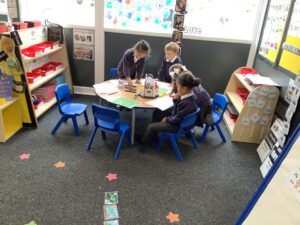
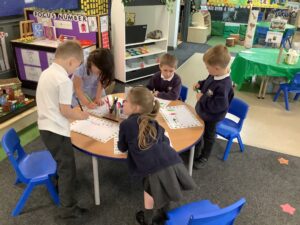
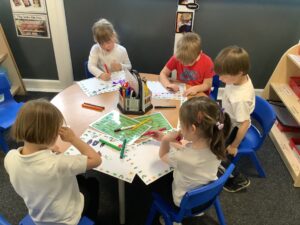 Maths
Maths
This week, we continued to focus on the purpose of counting – to find out ‘how many’ objects there are. The children revisited the concept of cardinality – the idea that the last number in the count tells us how many things there are altogether. While consolidating their understanding of the word pattern embedded within most of our number names, they also had fun hearing and practising the key differences in the number names when counting to 100!
A key focus this week, has been to develop their confidence in counting strategies when counting larger number of objects, including things that cannot be moved. On Wednesday, Gary (our counting puppet) found it really difficult to count the children when they were sat on the carpet – he kept forgetting who he counted! The children came up with some super counting strategies!
LW – Sit down when Gary taps you on the head.
PB – Gary could tap us on the head.
MC – We could stand in a circle.
BI – We could stand in a straight line.
The children had a go at using these strategies when collecting/counting their of objects.
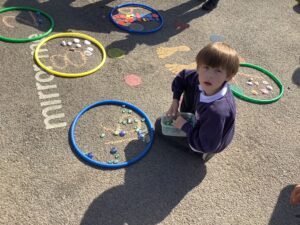
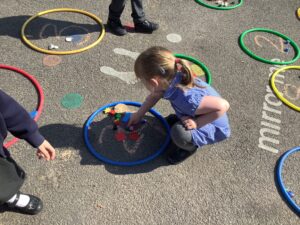
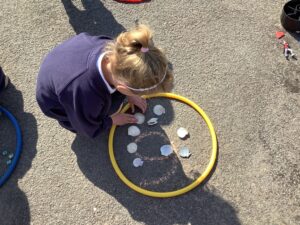
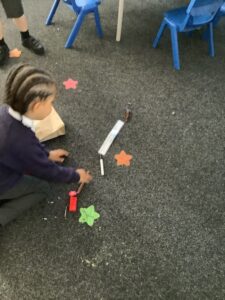
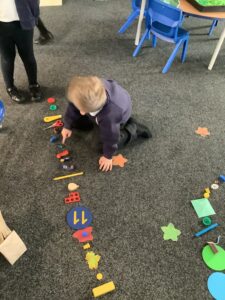 PE
PE
The children started learning how to skip. They had lots of fun using the big rope!
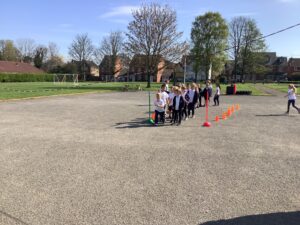
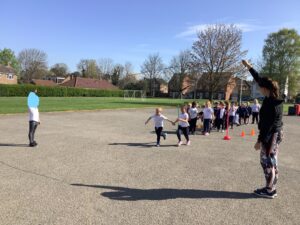
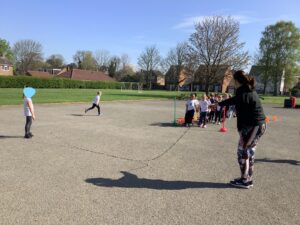
Here are some more highlights from this week…
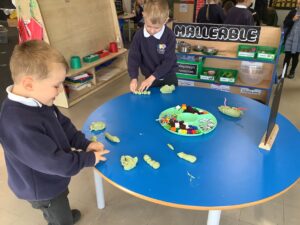
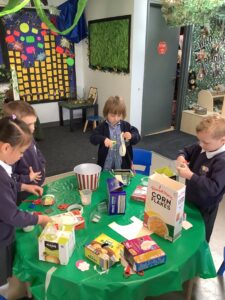
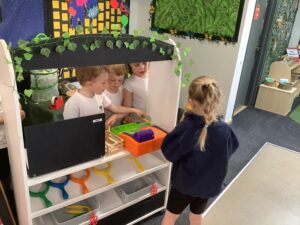
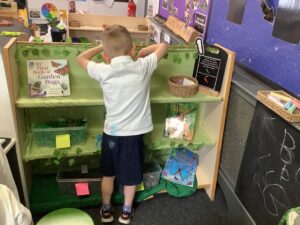
 Home-Link Challenge
Home-Link Challenge
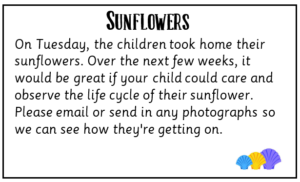
This week’s message (Friday 22 April 2022)
With bright sunny days, what a great week to kick off the Summer term! We hope you all had a lovely break.
Attendance
Our whole school attendance is at 93.8% – that’s a drop from 04 March when we last reported.
- Reception: 94.0% – that’s a rise since 04 March, so thank you!
- Year 1: 95.2%
- Year 2: 95.6%
- Year 3: 90.4%
- Year 4: 92.6%- that’s also a rise since 04 March, so well done!
- Year 5: 95.2%
- Year 6: 94.7%
It’s really clear from our assessments that children who attend school regularly are the most successful. Please make sure your child is coming to school as much as possible and getting to school on time.
Please remember that we’re not allowed to authorise term-time absence unless it’s in exceptional circumstances, and if you do need to request term-time absence it should be done in advance using a form you can collect at the office.
Updated NHS Covid symptoms lists
The NHS COVID-19 symptoms in adults and symptoms in children have been updated. Are you aware of all 12 possible symptoms?
The official advice is that adults and children who have symptoms of a respiratory infection, including Covid, should follow the UKHSA guidance. Children and young people who are unwell and have a high temperature should stay at home and avoid contact with other people, where they can. They can go back to school, college or childcare and resume normal activities when they no longer have a high temperature, and they are well enough to attend.
Have a happy and healthy weekend.
22 April 2022
The -t sound is usually spelt as -tch in the spoken word. Words of more than one syllable often have an unstressed syllable in which the vowel sound is unclear. There are some exceptions.
Y1: catch, fetch, kitchen, much, which
Adding -ed and -ing to words of one syllable ending in a single constant letter after a single vowel letter. The last constant letter of the root word is doubled to keep the short vowel sound. Exception: the letter ‘x’ is never doubled
Y2: pat, patted, patting hum, hummed, humming drop, dropped, dropping mix, mixed, mixing

22 April 2022
The spellings this week are based on homophones- words that have the same pronunciation but different meanings or spellings. Please learn them for a test on Thursday 28th April
- draught
- draft
- dissent
- descent
- decent
- proceed
- precede
- wary
- weary
22 April 2022
Our first Talk Time of this term poses a moral dilemma.
Plants and animals should not have the same rights as humans.
In a previous Talk Time, you’ve discussed human rights and the responsibilities that go with them. Recapping these could be how you choose to start this week’s conversations.
You might already have strong opinions on the matter but when faced with a statement such as this, it’s always worth exploring both sides of the argument so that you can make an informed decision.
These prompts might help you to consider things in a different way:
- Could plants and animals share all of the same rights as humans?
- If the rights were the same, who would be responsible for ensuring it?
- Are some rights easier to achieve than others?
- What should the consequences be for neglecting those rights?
- Should the level of punishment depend on whether the victim is a plant, animal or human?
- These are some topics you might discuss: deforestation, animal testing, human diet, hunting animals for fun
Last half term’s oracy focus was turn-taking. This skill will be very important in this task so refer to these R2s:
- If a person is speaking, listen to what they are saying.
- Let that person finish their point without interrupting them.
- When that person has spoken, acknowledge what they’ve said before making your point. Try using some of these phrases:
- I agree with that because…
- I also think that…
- Adding to what you said…
- I disagree with that because…
- I hear what you’re saying but…
- On the other hand, …